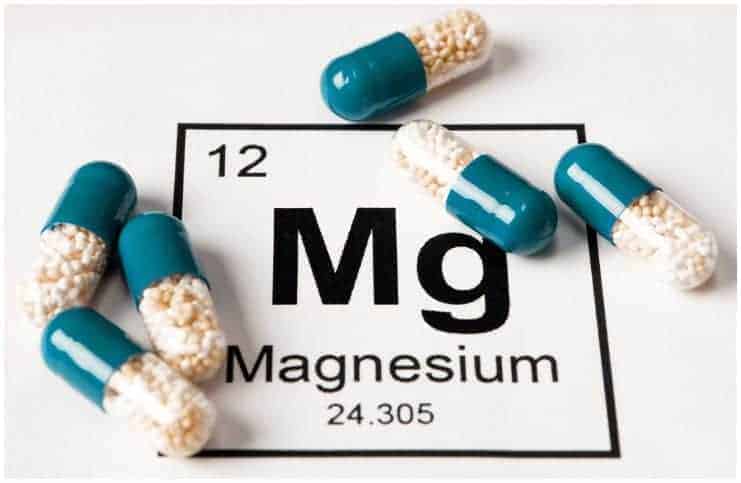Magnesium orotate (MO) is a form of magnesium supplement that consists of magnesium and orotic acid.
Orotic acid, previously referred to as vitamin B13 and initially considered to be a part of the B-complex vitamins, is actually a compound manufactured in the body (hence not a vitamin) and it is used for improving athletic endurance and performance as well as for heart health.
MO is different from regular magnesium and it does similar tasks in the human body as magnesium carbonate, however, it is much easily absorbed into tissues.
Magnesium Orotate vs Magnesium Citrate
Magnesium citrate is an Mg preparation in salt form with citric acid in a 1:1 ratio. However, this type of Mg supplement retains water in the intestines by osmosis. This commonly produces a bowel movement within 30 minutes to six hours.
Benefits
Mg is a cofactor in more than 300 enzyme systems that regulate a variety of biochemical reactions within the human body, like – muscle and nerve function, blood pressure, protein synthesis, and blood sugar activity. It is also required for the conversion of vitamin D (also known as the sunshine vitamin) into its active form.
Prevents Hypomagnesemia
Some people use this supplement to prevent or treat Mg deficiency, while other people use it for its orotic acid (helps Mg to cross cell membranes).
Common symptoms of an Mg deficiency may include:
- muscle twitches or cramps;
- teeth problems;
- irritability;
- migraines;
- hardening of the arteries (arteriosclerosis);
- hypertension;
- accelerated heart rhythm or palpitations;
- unpleasant body odor;
- PMS and menstrual cramps;
- eye twitching;
- autism;
- constipation;
- trouble swallowing;
- insomnia;
- headaches;
- sensitivity to loud noises;
- osteoporosis;
- anxiety;
- ADD;
- chronic fatigue;
- fibromyalgia;
- diabetes;
- obesity;
- asthma;
- irritable bowel syndrome;
- kidney stones.
It is estimated that only 32 percent of the adult population in the United States reaches the recommended daily intake of Mg.
Mg deficiency causes may include:
- autoimmune disorders;
- elevated inflammatory cytokines;
- high consumption of alcoholic beverages;
- long-term use of proton-pump inhibitors, like – Prevacid (lansoprazole) and Prilosec (omeprazole);
- use of diuretics, like – Lasix (furosemide) and Hydrodiuril (hydrochlorothiazide) can increase Mg loss in the urine;
- digestive diseases may also lead to this deficiency since problems with the gastrointestinal tract can cause the body not to absorb minerals and vitamins correctly, leading to deficiencies.
Anxiety
Anxiety-related disorders are the most frequent affective conditions present in the general population. Anxiety is described as nervousness or fear of what might happen.
Currently, more than 40 million people in the US over the age of 18 suffer from this condition, according to the Anxiety and Depression Association of America.
The good news is that clinical research concluded that this essential mineral may be useful as a treatment for reducing anxiety levels.
For instance, a French study established that people suffering from generalized anxiety disorder (GAD) experienced a considerable improvement in their anxiety symptoms when following an Mg regimen.
Sleep
10 to 15 percent of adult Americans have trouble sleeping all the time. In addition, 30 to 40 percent of adults say they have occasional insomnia, according to the National Sleep Foundation.
Mg has a crucial role in sleep because it induces sleepy states before actually falling asleep. Also, this mineral regulates melatonin, a hormone secreted by the pineal gland in the brain that guides sleep-wake cycles in the human body.
This mineral is also important for the function of GABA receptors (a class of receptors that respond to the neurotransmitter gamma-aminobutyric acid), which exist across all areas of the nervous system and brain.
GABA is a neurotransmitter which the brain needs to switch off. Without it, you may lie in bed without falling asleep.
Detox
Heavy metals like aluminum, lead, and mercury, are strongly associated with anxiety and other neurological disorders (such as – Parkinson’s Disease).
Maintaining high levels of Mg can prevent deficiencies that reduce the body’s functional capacity to detoxify heavy metals and lead to breakdowns in detoxification systems.
Bone Health
Mg has an important role in balancing calcium levels in the body. Interestingly, many people are aware of the fact that bone health and calcium go hand in hand.
Nevertheless, what people fail to realize is that without sufficient Mg intake, calcium levels are imbalanced.
Boosts Energy Levels
According to a study conducted by the USDA, people with low levels of Mg in the muscles use up more energy during physical exercise, hence, tire easily.
Dosage
The daily reference intake value for Mg is 265 mg for nonpregnant, nonlactating women over age 30 and 350 mg for men over age 30.
Side Effects of Magnesium Orotate
Too much Mg (from supplements) can lead to diarrhea, low blood pressure, loose stools, irregular heartbeat, confusion, rash, breathing problems, stomach upset, and dizziness.
If you have kidney disease or heart disease, do not take any type of Mg supplement without consulting with your healthcare provider first.
More importantly, if you are taking calcium channel blockers for high blood pressure, talk with your healthcare professional as it may increase the potential for adverse effects of these medicines.
Images credit – Shutterstock & Getty
READ THIS NEXT: Essential Oils For Bladder Infection
References https://www.ncbi.nlm.nih.gov/pmc/articles/PMC4586582/ https://www.webmd.com/vitamins/ai/ingredientmono-998/magnesium http://lpi.oregonstate.edu/mic/minerals



